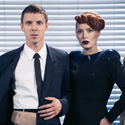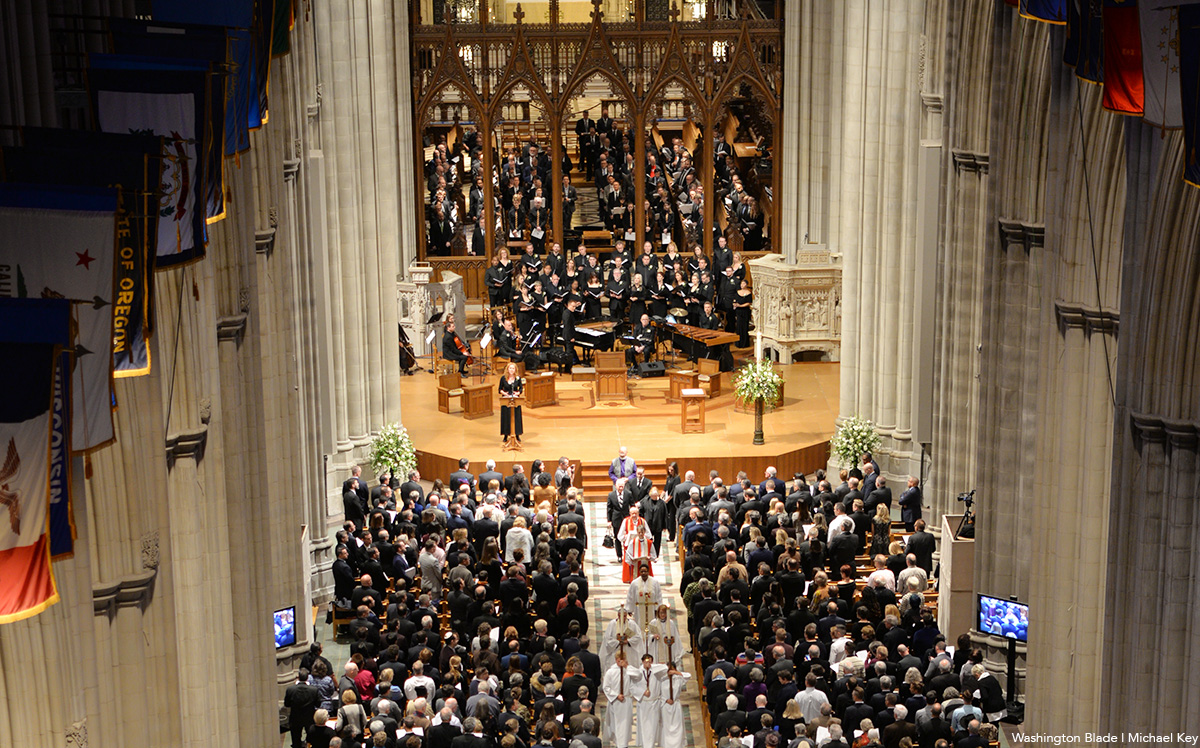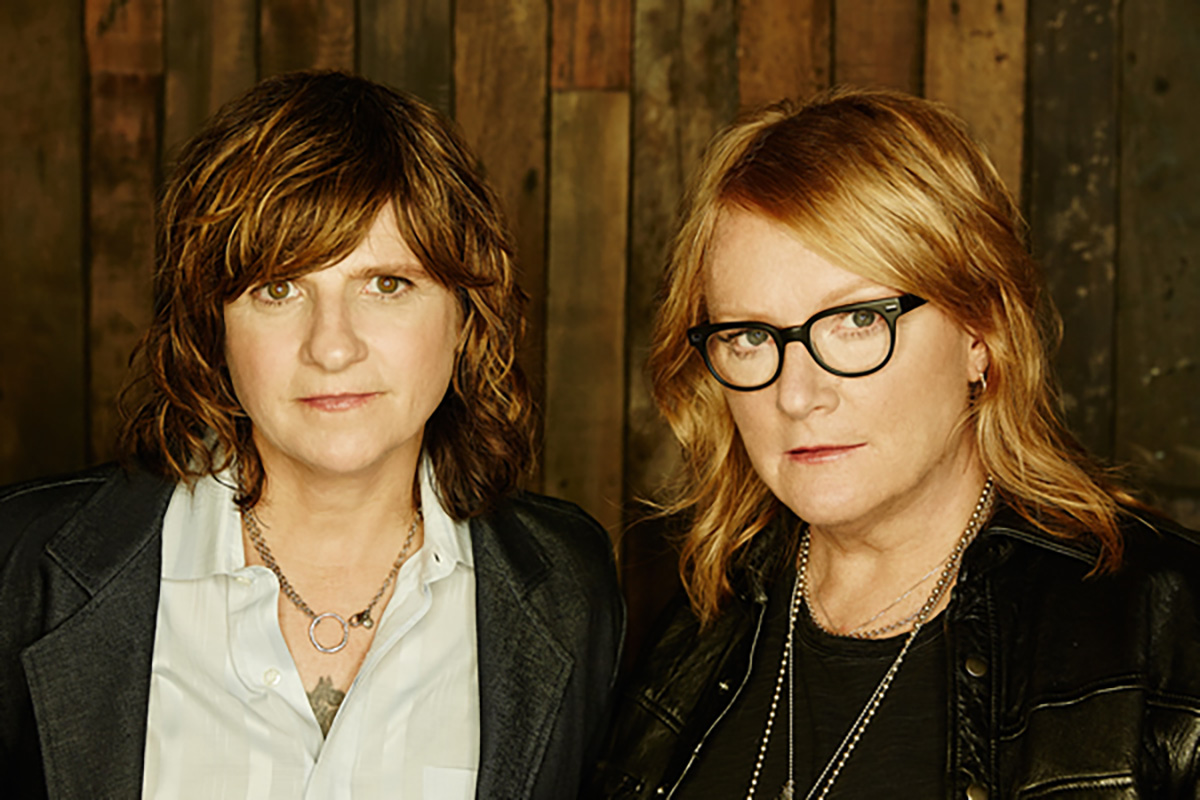Music & Concerts
Lauper soars, while Scissor Sisters stumble
2 new albums deliver wildly different results

Madonna is to Cyndi Lauper what Britney Spears is to Christina Aguilera.
With more than a decade to get to know the latter two, comparisons of Madge and Britney seem more laughable as time goes on while Lauper and Aguilera seem to share some cosmic sisterhood — they both have fabulous voices (Lauper’s is underrated, Aguilera’s overrated) and have tackled unexpected genres with aplomb.
I couldn’t help but ponder the comparisons when copies of new albums from both landed on my desk at the same time a couple weeks ago. Aguilera’s (“Bionic”) is an unfocused, over-produced mess but Lauper’s new project “Memphis Blues,” while ultimately a curiosity piece, has real merit.
Lauper, the most gay-supportive of any mainstream pop star, enjoys dabbling in specialty projects, which in the last decade or more have outnumbered her more mainstream albums. “Blues,” which enjoyed an unexpectedly high Billboard chart debut at 26, finds her working with several of the most respected players in the field (pianist Allen Toussaint, guitarist B.B. King and prodigy Jonny Lang chief among them) on a covers album that gives her plenty of space to sink her teeth into the most tried-and-true blues formulas of all time.
Hypnotically languid chord progressions, executed with tinkling pianos, swampy B-3 organs and ringing electric guitars, are the foundations of most of the tracks. There’s nary a dud in the batch but standouts abound such as the down-and-out Lang duet “How Blue Can You Get,” the sax-ridden showstopper “Don’t Cry No More” and a tougher, almost rockified “Rollin’ and Tumblin’,” which is given heft by gritty soul vocals from Ann Peebles (of “I Can’t Stand the Rain” fame).
Coming on the heels of 2008’s dance record “Bring Ya to the Brink,” it’s great to see Lauper, whose career has meandered at times with eons between releases, back in a regular routine of inspiration. She uses her voice, often kittenish and playful here, to great effect. The record is much like her 2003 standards set “At Last”: it’s conceptually great and has some lovely moments, but ultimately is a bit too gimmicky to be considered a masterpiece.
Joey DiGuglielmo
SCISSOR SISTERS
“Night Works” is the second version of Scissor Sisters’ third album. A previous version, on which they had worked for 18 months, was scrapped due to the band being unhappy with the finished product. This new version was inspired by frontman Jake Shears’ clubbing in Berlin.
The album was co-produced by Stuart Price of Zoot Woman, who has also worked with Madonna, Kylie Minogue, Gwen Stefani and Frankmusik. This is the first time that Scissor Sisters have worked with another producer.
“Fire With Fire” finds them returning to their Elton John influences of their first album, though with a pop treatment.
“Invisible Light” with its New Order-styled production, is pop perfection. It also has Sir Ian McKellen with a spoken word interlude at the song’s end sounding reminiscent in style to that on Michael Jackson’s “Thriller.”
Unfortunately, that’s where anything remotely original ends. The rest of this album sounds tired and clichéd. Whether it was intentional that they tried to sound retro or they were trying to be cute, the result lacks originality.
The one positive highlight of “Night Works” is Ana Matronic. She needs to try a solo effort, as it seems Scissor Sisters has run out of new ideas.
Rob Boeger
Music & Concerts
Red, White, and Beyoncé: Queen Bey takes Cowboy Carter to D.C. for the Fourth of July
The legendary music icon performed on July 4 and 7 to a nearly sold-out Northwest Stadium.

Just in time for Independence Day, Beyoncé lit up Landover’s Commanders Field (formerly FedEx Field) with fireworks and fiery patriotism, bringing her deeply moving and genre-defying “Cowboy Carter” tour to the Washington, D.C. area.
The tour, which takes the global icon across nine cities in support of her chart-topping and Grammy-winning country album “Cowboy Carter,” landed in Prince George’s County, Maryland, over the Fourth of July weekend. From the moment Beyoncé stepped on stage, it was clear this was more than just a concert — it was a reclamation.
Drawing from classic Americana, sharp political commentary, and a reimagined vision of country music, the show served as a powerful reminder of how Black Americans — especially Black women — have long been overlooked in spaces they helped create. “Cowboy Carter” released in March 2024, is the second act in Beyoncé’s genre-traversing trilogy. With it, she became the first Black woman to win a Grammy for Best Country Album and also took home the coveted Album of the Year.
The record examines the Black American experience through the lens of country music, grappling with the tension between the mythology of the American Dream and the lived realities of those historically excluded from it. That theme comes alive in the show’s opening number, “American Requiem,” where Beyoncé sings:
“Said I wouldn’t saddle up, but
If that ain’t country, tell me, what is?
Plant my bare feet on solid ground for years
They don’t, don’t know how hard I had to fight for this
When I sing my song…”
Throughout the performance, Beyoncé incorporated arresting visuals: Black cowboys on horseback, vintage American iconography, and Fox News clips criticizing her genre shift — all woven together with voiceovers from country legends like Dolly Parton and Willie Nelson. The result was a multimedia masterclass in storytelling and subversion.
The “Cowboy Carter” tour has been a social media sensation for weeks, with fans scrambling for tickets, curating elaborate “cowboy couture” outfits, and tailgating under the summer sun. At Commanders Field, thousands waited in long lines for exclusive merch and even longer ones to enter the stadium — a pilgrimage that, for many, felt more like attending church than a concert.
One group out in full force for the concert was Black queer men — some rocking “denim on denim on denim on denim,” while others opted for more polished Cowboy Couture looks. The celebration of Black identity within Americana was ever-present, making the concert feel like the world’s biggest gay country-western club.
A standout moment of the night was the appearance of Beyoncé’s 13-year-old daughter, Blue Ivy Carter. Commanding the stage with poise and power, she matched the intensity and choreography of her mother and the professional dancers — a remarkable feat for someone her age and a clear sign that the Carter legacy continues to shine.
It’s been nearly two decades since Beyoncé and Destiny’s Child parted ways, and since then, she’s more than lived up to her title as the voice of a generation. With “Cowboy Carter,” she’s not just making music — she’s rewriting history and reclaiming the space Black artists have always deserved in the country canon.
Music & Concerts
Berkshire Choral to commemorate Matthew Shepard’s life
Concert held at Washington National Cathedral

Berkshire Choral International will present a concert performance of composer Craig Hella Johnson’s fusion oratorio “Considering Matthew Shepard” on Friday, July 11, 2025 at 7:30 p.m. at the Washington National Cathedral.
The program will be guest conducted by Dr. Jeffrey Benson, a native of the DMV who currently serves as Director of Choral Activities at San José State University. The concert is a partial benefit for the Matthew Shepard Foundation. Notably, Matthew’s remains are interred at the National Cathedral and his parents, Dennis and Judy, will give opening remarks at the performance.
Tickets are $20 – $65, and 50% of ticket proceeds will be donated to the Matthew Shepard Foundation. Tickets are only available online at berkshirechoral.org.
Music & Concerts
Indigo Girls coming to Capital One Hall
Stars take center stage alongside Fairfax Symphony

Capital One Center will host “The Indigo Girls with the Fairfax Symphony Orchestra” on Thursday, June 19 and Friday, June 20 at 8 p.m. at Capital One Hall.
The Grammy Award-winning folk and pop stars will take center stage alongside the Fairfax Symphony, conducted by Jason Seber. The concerts feature orchestrations of iconic hits such as “Power of Two,” “Get Out The Map,” “Least Complicated,” “Ghost,” “Kid Fears,” “Galileo,” “Closer to Fine,” and many more.
Tickets are available on Ticketmaster or in person at Capital One Hall the nights of the concerts.
-

 Federal Government2 days ago
Federal Government2 days agoTreasury Department has a gay secretary but LGBTQ staff are under siege
-

 Virginia3 days ago
Virginia3 days agoDefying trends, new LGBTQ center opens in rural Winchester, Va.
-

 District of Columbia2 days ago
District of Columbia2 days agoGay GOP group hosts Ernst, 3 House members — all of whom oppose Equality Act
-

 Opinions4 days ago
Opinions4 days agoUSAID’s demise: America’s global betrayal of trust with LGBTQ people






